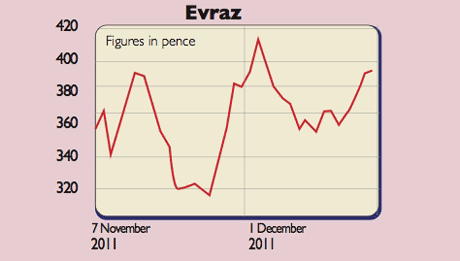Get the latest financial news, insights and expert analysis from our award-winning MoneyWeek team, to help you understand what really matters when it comes to your finances.
You are now subscribed
Your newsletter sign-up was successful
Want to add more newsletters?

Twice daily
MoneyWeek
Get the latest financial news, insights and expert analysis from our award-winning MoneyWeek team, to help you understand what really matters when it comes to your finances.

Four times a week
Look After My Bills
Sign up to our free money-saving newsletter, filled with the latest news and expert advice to help you find the best tips and deals for managing your bills. Start saving today!
With extreme pessimism surrounding the eurozone, it is easy to forget that the world's largest economy is ticking along nicely. US employment and GDP are both improving, and steel prices are up more than 20% since October, thanks to robust demand from the automotive, oil-drilling and agricultural sectors. That's good news for Evraz, Russia's largest, and the world's 15th-largest, steel-producer by volume. The firm listed in London at £3.20 a share in November, putting it into the FTSE 100 with a market capitalisation of £4.3bn.
Evraz gets 42% of its revenues from the former Soviet Union. It also has interests in North America (17%), Asia (29%), Europe (9%) and Africa (3%). It enjoys a leading position in manufacturing railway tracks, and intends to boost its capacity in the US by 10% to 15% this year.
"We expect 2012 to be one of the busiest for railway firms since World War II," says Pavel Tatyanin, who oversees Evraz's international operations. "In all our markets, except for Europe, we don't see a decline in physical demand." Evraz is set to invest $5bn by 2017 in new facilities to lift annual output in eastern Europe from 13 million to 19 million tons. Better still, Evraz is one of the industry's lowest-cost producers due to its upstream interests. It owns substantial iron ore and coking coal deposits, which together provide 80% of raw-material requirements. The firm is also a leader in mining vanadium, which is used to reinforce steel.
MoneyWeek
Subscribe to MoneyWeek today and get your first six magazine issues absolutely FREE

Sign up to Money Morning
Don't miss the latest investment and personal finances news, market analysis, plus money-saving tips with our free twice-daily newsletter
Don't miss the latest investment and personal finances news, market analysis, plus money-saving tips with our free twice-daily newsletter
Analysts expect turnover and earnings before interest, tax, depreciation and amortisation (EBITDA) for 2011 to come in at $16.3bn and $2.9bn respectively, rising to $16.9bn and $3.2bn in 2012. This assumes margins of 19%, following 2009 levels of 30% or more. I rate the stock on a six-times through-cycle EBITDA. Adjusting for net debt of $6.6bn, that generates an intrinsic value of about 550p a share.
Evraz (LSE: EVR), rated a BUY by ING Banking

Evraz isn't for the faint-hearted. It's still exposed to volatile steel prices, currency fluctuations and changes in commodity prices. As a result it would be hit by a hard landing in Asia. The group is also part-owned by the founder-chairman Alexander Abramov (25% stake), chif executive Alexander Frolov (12%) and Roman Abramovich (35%), the billionaire owner of Chelsea Football Club.
Even though there are plans to appoint an independent chairman to improve corporate governance, this capital structure could pose geopolitical risks with Russian elections in March, and Vladimir Putin attempting to reclaim the Kremlin. Net debt at 2.3 times EBITDA also needs to be watched and Evraz is exposed to environmental issues, accidents and natural disasters. There was a mid-rated earthquake in Siberia last week, which, while no damage has been reported, has temporarily halted production at one of its associate companies.
But I think these concerns are factored into the miserly valuation. If Europe doesn't fall off a cliff, then the stock is attractively priced. Bank ING has a target price of 660p and fourth-quarter production figures are scheduled for 18 January.
Paul Hill also writes a weekly share-tipping newsletter, Precision Guided Investments. See www.moneyweek.com/PGI , or phone 020-7633 3634 for more.
Get the latest financial news, insights and expert analysis from our award-winning MoneyWeek team, to help you understand what really matters when it comes to your finances.
Paul gained a degree in electrical engineering and went on to qualify as a chartered management accountant. He has extensive corporate finance and investment experience and is a member of the Securities Institute.
Over the past 16 years Paul has held top-level financial management and M&A roles for blue-chip companies such as O2, GKN and Unilever. He is now director of his own capital investment and consultancy firm, PMH Capital Limited.
Paul is an expert at analysing companies in new, fast-growing markets, and is an extremely shrewd stock-picker.
-
 How a ‘great view’ from your home can boost its value by 35%
How a ‘great view’ from your home can boost its value by 35%A house that comes with a picturesque backdrop could add tens of thousands of pounds to its asking price – but how does each region compare?
-
 What is a care fees annuity and how much does it cost?
What is a care fees annuity and how much does it cost?How we will be cared for in our later years – and how much we are willing to pay for it – are conversations best had as early as possible. One option to cover the cost is a care fees annuity. We look at the pros and cons.